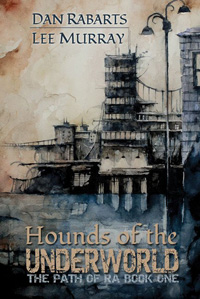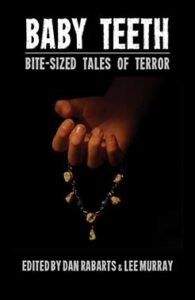 Today, Dan Rabarts, a Most Excellent Writer, takes over the blog to talk about collaboration.
Today, Dan Rabarts, a Most Excellent Writer, takes over the blog to talk about collaboration.
Better Together – Collaboration as a Productivity Booster
You’re a writer, you’re a creative. You wish you could produce more, but holy crap, there are only so many hours in the day and so much gas in the tank and so much inspiration hitting you when you’re in the right frame of mind to be open to it. You’ve got the distractions of the day job, and family, and the dog needing a walk, and inclement weather, and the new season of Game of Thrones, and social media.
Sometimes you just want it all to go away so you can get the words down on the page when they’re there to get down. Miss that window and they’re gone forever. But life, bro. Life demands. Even if we can control things like how long we spend Social Media-ing, and whether we really want to see Ed Sheeran aspiring to knighthood, or even if the dog could just harden up and take himself for a walk like his lupine ancestors used to, our resources are finite. How can we leverage more out of these limitations?
Easy, says Dan. Look at the title of the post. Just work with someone else. Done and dusted.
Yeah, right. If only it was that easy.
A few days ago, over on Alan Baxter’s blog, I talked about the value of writing communities and, by extension, collaboration. If you haven’t read it, pop over there and take a look. We’ll be here waiting until you get back.
Great, nice to see you again. So, like I said, a few years ago circumstances led to the evolution of an editing and writing partnership between Lee Murray and myself which has proved highly fruitful. Would it be fair to say that because there are two of us working on the same project, we get more done, and faster? Nope. Not at all. So if not, then what’s the point? Gimme a minute. I’ll get to that.
The first rule of Write Club is: There are no rules. Well, apart from Joss Whedon’s rule about not being a dick which, to be honest, is a pretty good rule for life in general, but aside from that, there’s no right or wrong way to go about being a writer. There are things that work well and things that don’t work so well. There are things some people do better than others. Writing is a business and like any business the requirements to keep it ticking over are manifold. There’s the planning and design, the supply chain, the marketing, the legal compliance, the scheduling, the deliverables, the accounting, the quality control, the management of assets, the public relations. As a writer, you’ve probably taken on many of these tasks along the way, depending on the scale of your operation, not just the generation and crafting of words. It’s a lot of work, and merely writing well isn’t always enough. 
By collaborating, you can work towards balancing these tasks. First up, chances are when you enter into a partnership, you’re going to bring different skills to the table, different strengths. The aforementioned jobs can now be spread around, to be handled by the person best suited to the role. This applies equally to the creative part of the writing as it does to the business end. But let’s talk about the writing.
Working with Lee, when we’re on the Making New Words part of a project, she brings a tighter focus to the structure and plotting of the piece, which gives us direction, while I tend to bring a certain flair to the wordage and take the story off on unexpected tangents, which gives us momentum. Direction plus momentum equals velocity, right? I’m sure that’s physics, or something. The result is something tighter, stronger than either of us might have created on our own.
When writing in the Path of Ra world, we trade the story back and forth between Penny’s and Matiu’s POV, and so each of us is regularly sitting down to read the next instalment—as written by the other collaborator—in the story, not quite sure what we’re going to find. Seeing the next section take shape is invigorating, and here’s where we start to see the productivity. We’ve handed the work off for a few days, and when we come back to it, the story has developed. We knew roughly where it was heading, but now here we are, fresh new words scribed, new actions exposed, unexpected twists thrown in the mix. We’ve also had a few days to think about where we plan to go next, and now we’ve got a pile of new material to work in with to drive us towards that goal. Therein lies inspiration, and when you sit down to work on something which has just suffered a massive dose of someone else’s creative energy, that energy pulses back out and infects you, gives you a shot in the arm, or the head, or wherever you write from. The words that follow are tighter, because you’re fresh, you’re inspired, you’re working towards a common goal and you know your teammate has got your back.
And you’re accountable. I work much better when I’m being held accountable, be it to a deadline or to a plot point or just to an agreement that we’re going to get this thing finished. Mostly though, it’s being accountable to your collaborator, because you’re in it together. You’re committing equally to the risk, and so you give it all you’ve got, because letting the other person down is not an option. So the time you spend hammering the keys is concentrated, dedicated, knowing there’s more to your success or failure here than just your own sense of completion. That sort of focus, for me anyway, makes what I create in those intense periods far more solid, because I’m not just answering to myself, but to the partnership. And if I can create better words in the same timeframe in which I might have created mediocre words because there was no real pressure to make those words really boost the project that someone else is pouring so much effort into as well, then there’s productivity right there. There’s a business case for it.
 At the other end of the business model, where you’re sharing the logistical jobs around, you can hopefully focus on what you’re best at, knowing that your collaborator is strong in the areas where you might be weak. For Baby Teeth, I worked with Chris Barnes, our audio producer, and the late Lawrence Santoro at the Tales to Terrify podcast, to get a selection of stories onto the podcast to promote the book, because the podcast world is a sphere where I have some expertise and can engage with networks I’ve built up over the years. When we were looking for a publisher for Hounds of the Underworld, Lee took her extensive knowledge of the US horror market and applied it, arranging a pitch session with Jennifer Barnes at Raw Dog Screaming Press at StokerCon, and to that discussion she brought not only her co-authorship of the book but also her essential Kiwi background and her ability to pitch a project with verve and passion in a tough environment. In each of these examples we had successes where, if the other had been presented with the same challenge, we would not have had the skills base or the resources to manage what the other achieved. Together, Everyone Achieves More. It’s a cheesy acronym but it’s true.
At the other end of the business model, where you’re sharing the logistical jobs around, you can hopefully focus on what you’re best at, knowing that your collaborator is strong in the areas where you might be weak. For Baby Teeth, I worked with Chris Barnes, our audio producer, and the late Lawrence Santoro at the Tales to Terrify podcast, to get a selection of stories onto the podcast to promote the book, because the podcast world is a sphere where I have some expertise and can engage with networks I’ve built up over the years. When we were looking for a publisher for Hounds of the Underworld, Lee took her extensive knowledge of the US horror market and applied it, arranging a pitch session with Jennifer Barnes at Raw Dog Screaming Press at StokerCon, and to that discussion she brought not only her co-authorship of the book but also her essential Kiwi background and her ability to pitch a project with verve and passion in a tough environment. In each of these examples we had successes where, if the other had been presented with the same challenge, we would not have had the skills base or the resources to manage what the other achieved. Together, Everyone Achieves More. It’s a cheesy acronym but it’s true.
So like I said (not in so many words) over at Alan’s place, we’re not an island. We can’t do it all alone, however much we like to pretend we can. Collaboration is challenging, and there’s a hell of a lot of chance bound up in finding the right person or people to work with in order to truly find the synchronicity that leads to those gains, but once you find your stride, and you start hitting those marks, you might find that a good collaborator is worth more than all the quiet weekends tucked away from the world to get your writing done you’ll ever have. Sure, they’re good too, but if you can make a collaboration work, then for the love of all that’s holy keep it working, keep it strong. It might be the best thing you ever do for your writing.
_________
Dan Rabarts is an award-winning short fiction author and editor, recipient of New Zealand’s Sir Julius Vogel Award for Best New Talent in 2014. His science fiction, dark fantasy and horror short stories have been published in numerous venues around the world, including Beneath Ceaseless Skies, StarShipSofa and The Mammoth Book of Dieselpunk. Together with Lee Murray, he co-edited the anthologies Baby Teeth – Bite-sized Tales of Terror, winner of the 2014 SJV for Best Collected Work and the 2014 Australian Shadows Award for Best Edited Work, and At The Edge, a collection of Antipodean dark fiction, which won the SJV for Best Edited Work in 2017. His novella Tipuna Tapu won the Paul Haines Award for Long Fiction as part of the Australian Shadows Awards in 2017. Hounds of the Underworld, Book 1 of the crime/horror series The Path of Ra, co-written with Lee Murray and published by Raw Dog Screaming Press (2017), is his first novel. Find out more at dan.rabarts.com.
Baby Teeth – Bite Sized Tales of Terror (Paper Road Press, 2013)
At The Edge (Paper Road Press, 2016)
Hounds of the Underworld (Raw Dog Screaming Press, 2017) – http://amzn.to/2qdApt9

